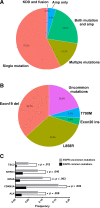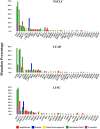Genomic Signature of Driver Genes Identified by Target Next-Generation Sequencing in Chinese Non-Small Cell Lung Cancer
- PMID: 30902917
- PMCID: PMC6853120
- DOI: 10.1634/theoncologist.2018-0572
Genomic Signature of Driver Genes Identified by Target Next-Generation Sequencing in Chinese Non-Small Cell Lung Cancer
Abstract
Background: Non-small cell lung cancer (NSCLC) is one of the most common human malignancies and the leading cause of cancer-related death. Over the past few decades, genomic alterations of cancer driver genes have been identified in NSCLC, and molecular testing and targeted therapies have become standard care for lung cancer patients. Here we studied the unique genomic profile of driver genes in Chinese patients with NSCLC by next-generation sequencing (NGS) assay.
Materials and methods: A total of 1,200 Chinese patients with NSCLC were enrolled in this study. The median age was 60 years (range: 26-89), and 83% cases were adenocarcinoma. NGS-based genomic profiling of major lung cancer-related genes was performed on formalin-fixed paraffin-embedded tumor samples and matched blood.
Results: Approximately 73.9% of patients with NSCLC harbored at least one actionable alteration recommended by the National Comprehensive Cancer Network guideline, including epidermal growth factor receptor (EGFR), ALK, ERBB2, MET, BRAF, RET, and ROS1. Twenty-seven patients (2.2%) harbored inherited germline mutations of cancer susceptibility genes. The frequencies of EGFR genomic alterations (both mutations and amplification) and ALK rearrangement were identified as 50.1% and 7.8% in Chinese NSCLC populations, respectively, and significantly higher than the Western population. Fifty-six distinct uncommon EGFR mutations other than L858R, exon19del, exon20ins, or T790M were identified in 18.9% of patients with EGFR-mutant NSCLC. About 7.4% of patients harbored both sensitizing and uncommon mutations, and 11.6% of patients harbored only uncommon EGFR mutations. The uncommon EGFR mutations more frequently combined with the genomic alterations of ALK, CDKN2A, NTRK3, TSC2, and KRAS. In patients <40 years of age, the ALK-positive percentage was up to 28.2%. Moreover, 3.2% of ALK-positive patients harbored multi ALK rearrangements, and seven new partner genes were identified.
Conclusion: More unique features of cancer driver genes in Chinese NSCLC were identified by next-generation sequencing. These findings highlighted that NGS technology is more feasible and necessary than other molecular testing methods, and suggested that the special strategies are needed for drug development and targeted therapy for Chinese patients with NSCLC.
Implications for practice: Molecular targeted therapy is now the standard first-line treatment for patients with advanced non-small cell lung cancer (NSCLC). Samples of 1,200 Chinese patients with NSCLC were analyzed through next-generation sequencing to characterize the unique feature of uncommon EGFR mutations and ALK fusion. The results showed that 7.4% of EGFR-mutant patients harbored both sensitizing and uncommon mutations and 11.6% harbored only uncommon mutations. Uncommon EGFR mutations more frequently combined with the genomic alterations of ALK, CDKN2A, NTRK3, TSC2, and KRAS. ALK fusion was more common in younger patients, and the frequency decreased monotonically with age. 3.2% of ALK-positive patients harbored multi ALK rearrangement, and seven new partner genes were identified.
Keywords: Molecular genomic profile; Next‐generation sequencing; Non‐small cell lung cancer.
© AlphaMed Press 2019.
Conflict of interest statement
Disclosures of potential conflicts of interest may be found at the end of this article.
Figures





Similar articles
-
Comprehensive molecular analysis of driver mutations in non-small cell lung carcinomas and its correlation with PD-L1 expression, An Indian perspective.Pathol Res Pract. 2024 Jan;253:155013. doi: 10.1016/j.prp.2023.155013. Epub 2023 Dec 6. Pathol Res Pract. 2024. PMID: 38096714
-
Comprehensive Genomic Profiling Facilitates Implementation of the National Comprehensive Cancer Network Guidelines for Lung Cancer Biomarker Testing and Identifies Patients Who May Benefit From Enrollment in Mechanism-Driven Clinical Trials.Oncologist. 2016 Jun;21(6):684-91. doi: 10.1634/theoncologist.2016-0030. Epub 2016 May 5. Oncologist. 2016. PMID: 27151654 Free PMC article.
-
Genetic Profiling of Non-Small Cell Lung Cancer in Moroccan Patients by Targeted Next-Generation Sequencing.Technol Cancer Res Treat. 2024 Jan-Dec;23:15330338241288907. doi: 10.1177/15330338241288907. Technol Cancer Res Treat. 2024. PMID: 39363851 Free PMC article.
-
Management and future directions in non-small cell lung cancer with known activating mutations.Am Soc Clin Oncol Educ Book. 2014:e353-65. doi: 10.14694/EdBook_AM.2014.34.e353. Am Soc Clin Oncol Educ Book. 2014. PMID: 24857124 Review.
-
Clinical significance of TP53 alterations in advanced NSCLC patients treated with EGFR, ALK and ROS1 tyrosine kinase inhibitors: An update.Tumour Biol. 2024;46(s1):S309-S325. doi: 10.3233/TUB-230034. Tumour Biol. 2024. PMID: 37840519 Review.
Cited by
-
Mutational Profile Evaluates Response and Survival to First-Line Chemotherapy in Lung Cancer.Adv Sci (Weinh). 2020 Dec 30;8(4):2003263. doi: 10.1002/advs.202003263. eCollection 2021 Feb. Adv Sci (Weinh). 2020. PMID: 33643802 Free PMC article.
-
Role of GPER1 in the Mechanism of EGFR-TKIs Resistance in Lung Adenocarcinoma.Front Oncol. 2022 May 18;12:869113. doi: 10.3389/fonc.2022.869113. eCollection 2022. Front Oncol. 2022. PMID: 35664735 Free PMC article.
-
Case Report: Dacomitinib is effective in lung adenocarcinoma with rare EGFR mutation L747P and brain metastases.Front Oncol. 2022 Aug 9;12:863771. doi: 10.3389/fonc.2022.863771. eCollection 2022. Front Oncol. 2022. PMID: 36016627 Free PMC article.
-
Genetic Alteration Profiling of Chinese Lung Adenocarcinoma and Its Effect on Targeted Therapy Efficacy.Front Oncol. 2021 Dec 14;11:726547. doi: 10.3389/fonc.2021.726547. eCollection 2021. Front Oncol. 2021. PMID: 34970478 Free PMC article.
-
Liquid-based cytology specimens for next-generation sequencing in lung adenocarcinoma: challenges and evaluation of targeted therapy.BMC Cancer. 2024 Jun 20;24(1):749. doi: 10.1186/s12885-024-12520-2. BMC Cancer. 2024. PMID: 38902688 Free PMC article.
References
-
- Torre LA, Bray F, Siegel RL et al. Global cancer statistics, 2012. CA Cancer J Clin 2015;65:87–108. - PubMed
-
- Siegel RL, Miller KD, Jemal A. Cancer statistics, 2017. CA Cancer J Clin 2017;67:7–30. - PubMed
-
- Chen W, Zheng R, Baade PD et al. Cancer statistics in China, 2015. CA Cancer J Clin 2016;66:115–132. - PubMed
-
- Han JY, Kim SH, Lee YS et al. Comparison of targeted next‐generation sequencing with conventional sequencing for predicting the responsiveness to epidermal growth factor receptor‐tyrosine kinase inhibitor (EGFR‐TKI) therapy in never‐smokers with lung adenocarcinoma. Lung Cancer 2014;85:161–167. - PubMed
Publication types
MeSH terms
Substances
LinkOut - more resources
Full Text Sources
Medical
Research Materials
Miscellaneous

